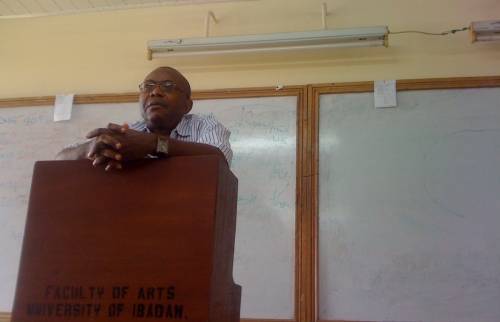
The current Alaafin of Oyo, Làmídì Oláyíwolá Adéyemí III sitting on his throne inside the royal chambers in Oyo city.
I was not well prepared to meet the king. Standing at the iron gates to the king’s palace surrounded by the sharp, rhythmic beats of talking drums, I was unimpressed and confused. Our teachers told us we were going to see the Alaafin of Oyo (the King of Oyo). At that time in October these words passed in one ear and out the other.
We are going to see a king, I thought,
how will he be different than the chairmen, big time boss executives or local politicians we have met, what role does a king have in society today anyway? Today, months after kneeling before the king himself, the significance of our meeting and the historical importance of his position in Yorubaland is dawning on me.

Here I am standing on a 400 year old tortoise who lives in the Alaafin's palace. Pretty incredible.
For the other four students and I, the experience was nothing more than greeting a very old well dressed man sitting in a gigantic cushioned chair, listening to him praise us while explaining the importance of learning other languages and snapping pictures in his royal chambers. I felt disconnected and foreign walking around the palace grounds; I could not fathom what it looked like at its height nor connect to the artifacts around the palace. The most exciting part of the tour was standing atop a 400 year-old turtle and taking pictures. Equipped with the knowledge I have now about the expansive power of the 16th-18th century Oyo Empire, with the Alaafin as it’s leader, I wish I was more curious in front of a person who comes from the lineage of such a monumental group of men in Nigeria and West Africa’s history.
Although Nigeria is a democracy–in fact we are in the middle of a presidential election right now–kings still exist in Yorubaland today. Each Yoruba city has one, but you do not just call him “king”, each one has his own particular name.

A map showing the size of the Oyo Empire at it's height in the 18th century.
There is the Aláàfin of Òyó, the Oba of Benin, the Oòni of Ifè, Sòún of Ògbómòsó, the Awùyalè of Ìjèbú, the Aláké of Ègbá, the Oba of Èkó, the Òsemàwé of Ondó and so on. Aláàfin means one who owns the palace,
aáfin. Today, the Aláàfin owns the palace in Oyo but he is not responsible for much more than that. When the British arrived in Nigeria in 1861 they established a new governing system that greatly reduced the Aláàfin and every other kings’ power.
The Aláàfin’s word used to be law. In the 16th-18th centuries, the Aláàfin of Òyó was the most powerful king out of the list because he the ruled the strongest, most expansive empire in all of Yorubaland (what is presently southwest Nigeria)–– the Oyo Empire. He had privileges no other citizen or official enjoyed. He could marry or gbesele any woman he pleased no matter if she was already married. In theory he was an absolute ruler. Other names for the Aláàfin include Kábíyèsí (the unquestionable ruler) iku baba yeye (one who can command death), ekeji orisha (second to the gods) Alashe (one with the authority). However, he relied on a council of seven kingmakers called the Oyo Mèsí which means Òyó mó èsí (the Oyo people who know the answer), to advise and legitimize his decisions.

The Oyo Mesi, the council to the king, with all of us in the Alaafin's greeting courtyard.
The Oyo Mèsí, under the leadership of the head council called the Basorun, had the power to remove him from power if he did not consult them before making a policy. Any rejected king was expected to commit suicide. Also, the Aláàfin could not dismiss the Oyo Mèsí because they–like the Aláàfin himself–were born in a hereditary lineage of chiefs.
These days (since British arrival), the king’s role is somewhat ambiguous, a fusion of monarchial traditional rule and foreign imported government. The state government and the governor have replaced the Aláàfin as the authority on political matters where he used to have control. Before British arrival, the Aláàfin’s court was the court of appeals in the land. All civil or criminal cases would be tried and decided there. Today his court deals with petty customary situations. The king used to collect taxes from all the citizens in Oyo. Today, the Aláàfin does not have a role in the constitution; the state government pays his monthly salary.

No shoes allowed in the Alaafin's greeting courtyard. Everyone who meets the Alaafin must have bare feet except for him.
The governor can remove him from the throne and must approve the election of a new king. The Aláàfin of today plays an advisory role to the state government. The governor consults him on matters and petitions him to convey or persuade the people about laws or policies. The governor knows that the local kings, especially the Aláàfin are the closest to the people and that citizens still have great reverence for the them.
The present Aláàfin of Òyó is Làmídì Oláyíwolá Adéyemí III. He was born in 1938 into the Adéyemí Alówólódù of the Aláàfin of Oyo dynasty. His father, Adéníran Adéyemí II was the Alaafin from 1945 until 1955 when was sent into exile by Chief Obáfémi Awólówò’s political party.

The current Aláàfin of Oyo, Lamidi Olayiwola Adeyemi III on his throne with another one on the left side, in the colors of the Nigerian flag.
Làmídì Oláyíwolá Adéyemí III, ascended the throne in 1970 when he was 29 years old and working as an insurance clerk in Lagos. He is a Muslim. At 73 years of age he is still ruling and attracting hundreds of people to his palace daily to pay him homage.
Meeting the Aláàfin of Oyo was surely an interesting, memorable experience. I mean it’s not everyday you meet a king. I just wish that I knew all I know now three months ago when I got on my knees on the deep red carpet in the sepia toned room, bowed my head and said “Kábíyèsí!”

All of our students sat in big cushioned armchairs on one side of the aisle while the Oyo Mesi and other guests sat across waiting for the formal meeting to commence.

Entrance to the Alaafin's royal chambers.

Contrast of the dimly lit king's chambers resplendent with intricate wood wall carvings to the intense sun and heat outside.

One of the Alaafin's wives outside her compound.

People playing the Shekere, a Yoruba instrument made by covering a calabash in a net of beads, as we leave the Alaafin's palace

All of us and our resident director in the Alaafin's greeting courtyard with the Alaafin himself.
Read Full Post »























